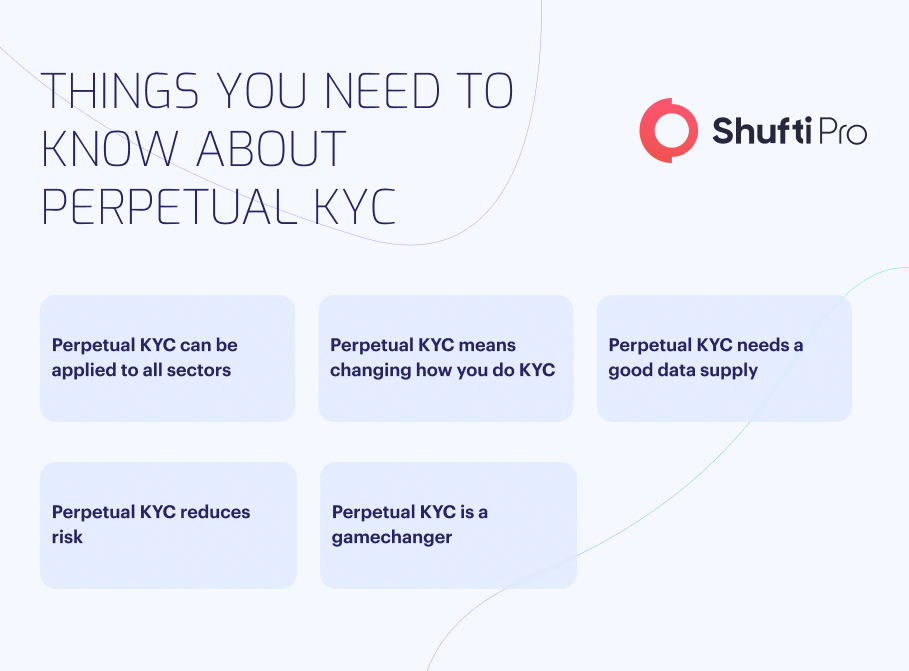Perpetual KYC – Securing Businesses through Continuous Identity Verification

With regulatory scrutiny increasing globally, failures or loopholes in security systems pose a significant challenge for financial institutions and other businesses. 2022 witnessed a 50% surge in global AML fines. Under Know Your Customer (KYC) and Anti-money Laundering (AML) regulations, banks and financial firms must periodically analyse and update relevant customer information. However, these periodic reviews are usually performed manually and are time-consuming. This is where perpetual KYC comes to the rescue.
Understanding Perpetual KYC
The AI-powered Perpetual KYC (pKYC) approach automates every stage of the periodic KYC review, leaving only some of the complicated situations that still need some level of human involvement. pKYC continuously monitors the client’s profile by verifying previously gathered data and also recognising and evaluating changes. Thus, the KYC process can be updated more frequently and effectively by integrating new and existing technology.
Why is Perpetual KYC Important?
As customer behaviour changes with time, businesses need to conduct perpetual KYC. Here’s how it is benefitting financial firms:
1. Long-term Verifiaction of Customers
Identity verification today involves bringing an individual’s offline personality to the digital world whilst verifying who they are every time they visit the account. It is no longer only about knowing someone when they sign up. Continuous monitoring done by the perpetual KYC process safeguards both the company and its clients.
2. Reduce Fraud and Increase Security
With traditional KYC procedures, high-risk customers go unreported until the subsequent re-verification occurs after months or years. This results in illicit activities, damaging businesses’ repuation. With pKYC, companies can spot and stop scammers and suspicious transactions considerably faster.
3. Improve Customer Relationships
47% of Americans reported having their financial identities stolen in 2020. This necessitated a robust identity verification solution deployed in firms, safeguarding consumer accounts and giving them a sense of security. Companies may lower the likelihood of account takeovers and prove to customers that they care about securing their personal data by reverifying individuals before they alter their passwords or contact details or make a significant purchase.
Though your customers know the requirement for identity verification, they lack the patience for complex or ineffective procedures. Customers that use traditional KYC due diligence techniques frequently have to provide the same data more than once, which increases employee workload and causes conversion drop-offs.
Perpetual KYC can simplify re-verification by gathering and retaining data in the user’s account. For instance, after a person’s driver’s licence and selfie have been validated during onboarding, the company might permit them to reverify their identification by asking them to take a new selfie and comparing it to the one on record.
4. Compliance and Regulations
A vital component of AML legislation mandates ongoing client due diligence for financial companies. Not abiding by the regulations would cause serious repercussions, including fines, criminal charges, and penalties. In September 2020, numerous international banks faced repercussions for maintaining business relationships with specific accounts despite proof of money laundering. Although the financial institutions had some KYC procedures in place, they failed to act in time, which resulted in huge fines and a sharp drop in the value of their shares.

The Key Considerations for Efficient Perpetual KYC
pKYC gives the industry a chance to address its persistent KYC issues, especially with potential cost reductions and quality improvements. However, there are different real-world obstacles for financial institutions to implement pKYC.
Here are the 4 points to consider for an efficient pKYC:
- Single End-to-end Solution: Several regtech vendors in the market makes it challenging for financial firms to decide which service providers to opt for. Businesses must choose a pKYC solution provider with a deep understanding of the technology’s operation. This helps them avoid cumbersome scans and selection processes.
- Project Management and Coordination: For a successful perpetual KYC solution, it is essential to integrate various technologies and have a centralised management system. Moreover, businesses must consider those solution providers with expertise in multiple solutions for smooth and effective implementation. The lead party must collaborate with bank stakeholders and other vendors as part of the consortium. This enables effective communication, which is necessary for getting the desired outcome and managing dependencies between systems.
- To be Integrated into a Business’s Overall Risk Management Strategy: KYC is just a part of a thorough risk management programme, and companies must ensure that they take a holistic approach to managing the risks. They must consider regulatory compliance and fraud prevention when investing in the pKYC process.
- Transiting from Existing Protocols: Shifting towards pKYC requires changes in the firms’ current protocols. A structured programme that manages the transition is necessary to facilitate the process. Moreover, employees must be trained on pKYC, so they can shift from the time-consuming KYC to the pKYC system, focusing on higher risk factors.
How Can Shufti Help?
Shufti offers globally trusted identity verification services that help financial firms and the banking sector combat financial crime and adhere to global KYC and Anti-money Laundering (AML) regulations. Our perpetual KYC solution will facilitate banks in strictly checking customers’ activities and monitoring their transactions in real-time. Powered by thousands of Artificial Intelligence (AI) algorithms, Shufti verifies identities within seconds with an accuracy rate of 99.3%.
Still confused about how a perpetual KYC solution helps banks and financial firms?

 Explore Now
Explore Now













